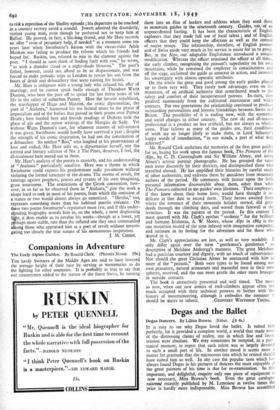Companions in Adventure
The Early Alpine Guides. By Ronald Clark. (Phoenix House. 159
TILE hardy Switzers of the Middle Ages are said to have lowered the average height of their race by serving as mercenaries to do the fighting for other countries. It is probably as true to say that our countrymen added to the stature of the finest Swiss, by turning'
them into an elite of leaders and athletes when they used them as mountain guides in the nineteenth century. Guides, too, of an unprecedented footing. It has been the characteristic of English explorers that they made full use of local talent ; and of English officers that they could keep the affection as well as the control of native troops. The relationship, therefore, of English pioneer and of Swiss guide very much in his service is easier for us to grasp. But, in the Alps, our adaptable Englishman introduced a unique modification. Whereas the officer remained the officer at all times, the early climber, recognising the peasant's superiority on his own mountains, while he remained the employer in consciousness and off the stage, acclaimed the guide as autocrat in action, and invested his sovereignty with almost operatic attributes.
On the whole the great and good among the early guides played up to them very well. They rarely took advantage, even on the mountain, of an artificial authority that contributed much to the safety and comfort of their inexperienced patrons. In—turn, they profited enormously from the cultivated intercourse and wider contacts. For two generations the relationship continued to produee outstanding personalities and historic friendships between Swiss and Briton. The possibility of it is ending now, with the economic and social changes in either country. The new ski and all-season professional is a product no less artificial, but not always as whole- some. Fine fellows as many of the guides are, their conditions of work are no longer likely to make them, in Lord Schuster's happy words of introduction, "in our minds, a part of what they achieved."
Mr. Ronald Clark enshrines the memories of the first great guide; for us, basing his work upon the famous book, The Pioneers of the Alps, by C. D. Cunningham and Sir William Abney, and using Abney's artistic portrait photographs. He has grouped the same men more discreetly by their districts, and distinguished those who travelled abroad. He has amplified their histories by careful study of other authorities, and enlivens them by anecdotes from mountain authors of the period. He comments with justice upon the little personal information discoverable about them, other than what The Pioneers collected in the guides' own lifetimes. Their employers, if they knew about their home lives, would have thought it in- delicate at that date to record them. Their heroes awaited them where the romance of their mountain holiday started, did great deeds through the climbing days, and waved them farewell at the terminus. It was the pattern of the period. In this context I must quarrel with Mr. Clark's epithet " sardonic" for the brilliant and humane Irishman, A. W. Moore, whose Alps in /864 is the one mountain record of the time infused with imaginative sympathy, and intimate in its feeling for the adventure and for those who shared in it.
Mr. Clark's appreciations are just, as well as very readable. I only differ again over the term " gentleman's gentleman" as descriptive of Melchior Anderegg's manners. The great Melchior had a patrician courtesy and dignity, with no touch of subservience. Nor should the great Christian Almer be contrasted with him as more of the " peasant." Both were types to be found among our own peasantry, natural aristocrats and masterful men in their own spheres, reserved, and the one more gentle the other more brusque in outside contacts.
The book is attractively presented and well timed. The more so now, when our new armies of rock-climbers appear often too much occupied with their technical prowess to bother with the history of mountaineering, although it embodies the romance :t should be theirs to inherit. -GEOFFREY WINTHROP YOUNG.














































































 Previous page
Previous page